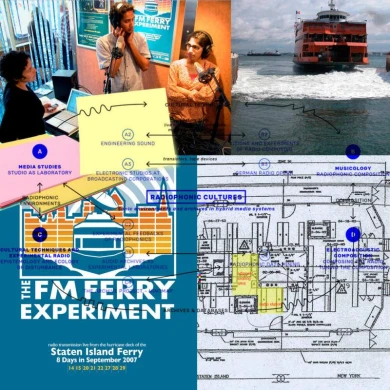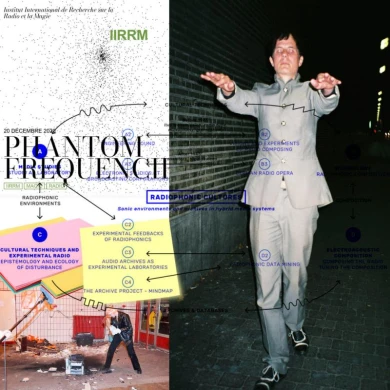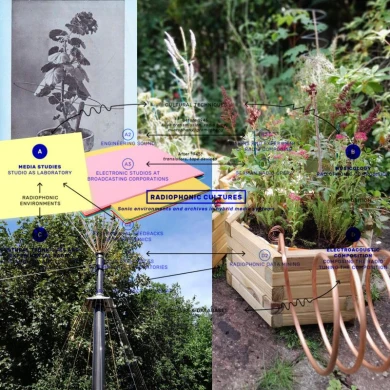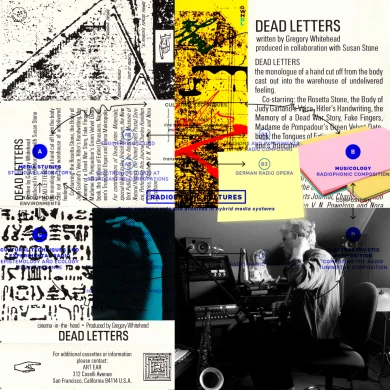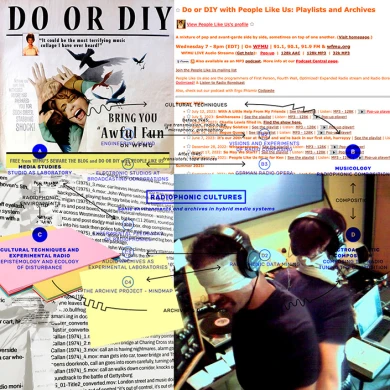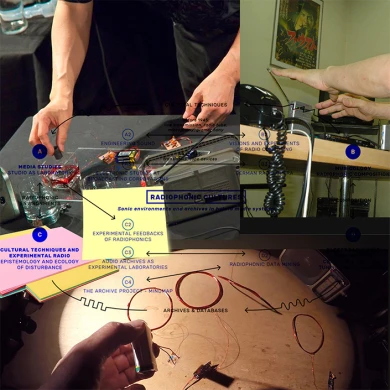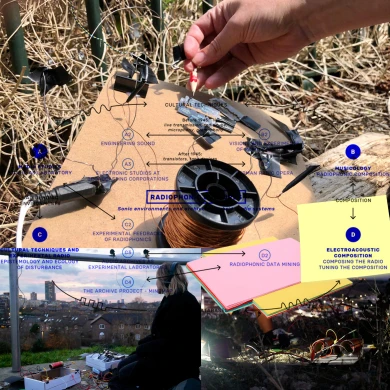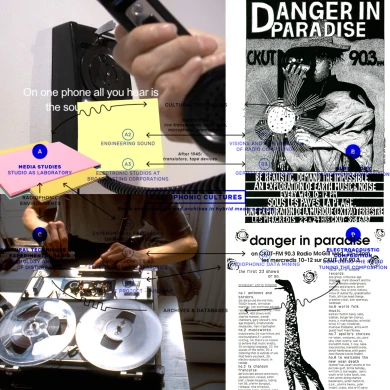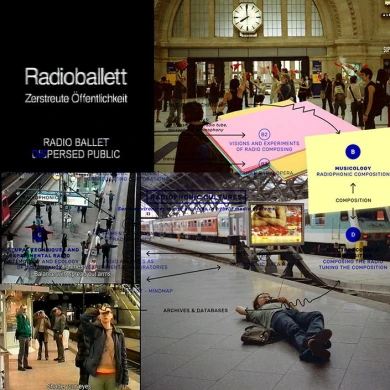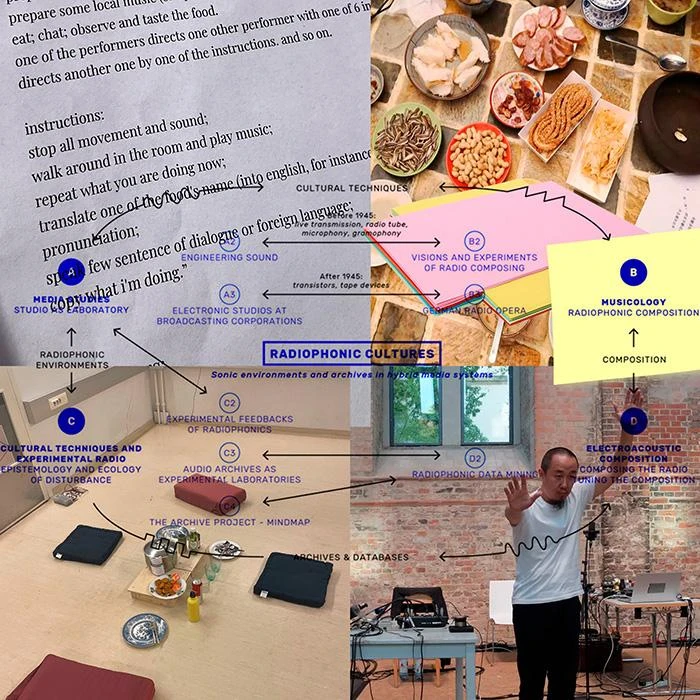
Is There Really a Place on Radio for Experimentation?
"Musically Homeless (Homage to PF & DW)" by Yan Jun on Public Space (B2 Visions and experiments of radio composing)
"Musically homeless" was written for an online live broadcast prepared for the Tsonami Music Festival in Chile. Its title comes from a saying the Swiss artists Peter Fischli & David Weiss said somewhere. In this composition I also drew on their favorite game rules.
To 4 players from different places. One hour.
Prepare some local food and snacks.
Each person prepares a piece of local music.
(“Place” can be your hometown or any place where you have lived for a period of time)
Eat and drink naturally, observe and talk about the food.
Each time one person gives an instruction to another person, the other person completes the instruction and gives an instruction to any next person, and so on.Instructions:
(Can be communicated with cards or gestures)
- Stop all movements and sounds.
- Stand up, walk around the room, and play music on your phone.
- Repeat your current actions and sounds.
- Use translation software to translate the name of a food into English and play it.
- Speak one or two dialects or foreign languages.
- Follow me and do the same thing.
Yan Jun
Yan Jun lives and works in Beijing, China. He is a poet and a musician who works with field recording, body, electronic noise and ideas (many!). Amongst many others, he participated in Gwangju Biennale (2018), Documenta (2017) and the Shanghai Biennale (2014). He was in residency at DAAD, Berlin, in 2016. His main recent activities are what he calls «non-music», the band Fen (Otomo Yoshihide / Ryu Hankil / Yuen Chee Wai/ Yan Jun), and the project The Living Room Tour (many locations, one of them being Montreal, Canada in 2016, 6 performances curated by Eric Mattson). He is also one of the minds behind the Chinese music label Subjam.
-
Radio, as a heterogeneous mix of technological progress and aestheticised desire, goes far beyond being merely a medium of communication. This series of podcasts aims to highlight this fact, offering a selection within the wide variety of topics currently being explored, most notably the confluences and limits and the possibilities of dissemination and the presence of silenced histories.
Depending on the chosen historical and theoretical paradigm, multiple and even contradictory histories of radiophony can be constructed. Therefore, research starts from a general corpus of concepts which explore, along with a fascination with the medium, a utopian and unconventional treatment: the "Radio-Eye" and the Radio-Pravda manifesto of Dziga Vertov; the public interaction and communication of Bertolt Brecht; William Burroughs' cut-ups and communicative disruption; Velimir Khlebnikov's "The Radio of the Future"; and the concept "Radio Mind" by psychologist Upton Sinclair. As media theorist Allen S. Weiss states: “Radio is not a singular entity but rather a multitude of radios” and "radiophonia is a heterogeneous field encompassing diverse apparatus, practices, forms, and utopias”.
Opposite the canonisation of the field and radiophonic methods, there are people and collectives that opt to keep margins fluid and encourage participation, reflection and interaction through experimental approaches and applications. To invent and reinvent radio is to approach radiophonic space as a creative space. Thus, the series seeks to establish an open and fragmented dialogue with media artists, creators and thinkers on the relationship between radio, society, technology and experimentation through singular and idiosyncratic radio pieces.
Participants
Yan Jun
ives and works in Beijing, China. He is a poet and a musician who works with field recording, body, electronic noise and ideas (many!). Amongst many others, he participated in Gwangju Biennale (2018), Documenta (2017) and the Shanghai Biennale (2014). He was in residency at DAAD, Berlin, in 2016. His main recent activities are what he calls «non-music», the band Fen (Otomo Yoshihide / Ryu Hankil / Yuen Chee Wai/ Yan Jun), and the project The Living Room Tour (many locations, one of them being Montreal, Canada in 2016, 6 performances curated by Eric Mattson). He is also one of the minds behind the Chinese music label Subjam.
Agnès Pe
To Antti Tolvi and Rasmus Östling
- Yan Jun, Musically Homeless (Homage to PF & DW) [live at Tsonami festival, Valparaiso, 2020] (Oral Records, 2020). Available at: https://oralrecords.bandcamp.com/album/yan-jun-musically-homeless-homage-to-pf-dw
- Toshimaru Nakamura & Yan Jun, "b1" in Oh My God, and yours. Subjam, 2020. Available at: https://subjamlabel.bandcamp.com/album/oh-my-god-and-yours
- Peter Fischli & David Weiss, The Way Things Go, film, 1987
